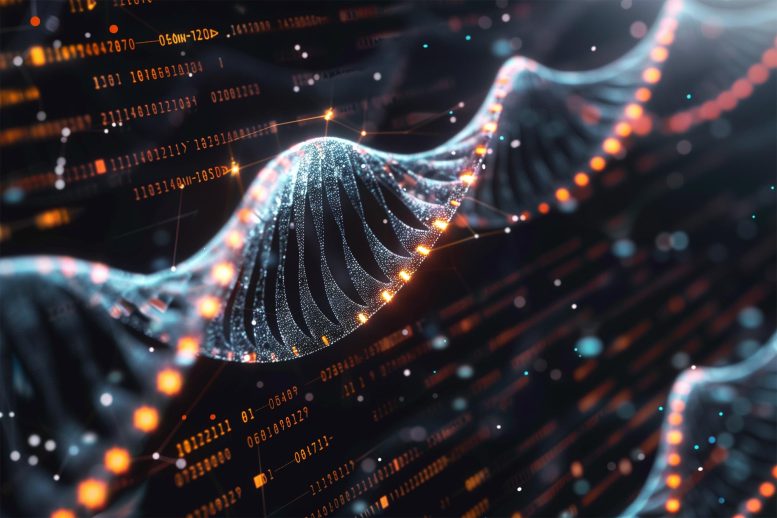[ad_1]

A pioneering collaboration has been established to give attention to utilizing quantum computing to boost genomics. The group will develop algorithms to speed up the evaluation of pangenomic datasets, which may revolutionize personalised medication and pathogen administration. Credit score: SciTechDaily.com
A brand new mission unites world-leading consultants in quantum computing and genomics to develop new strategies and algorithms to course of organic knowledge.
Researchers goal to harness quantum computing to hurry up genomics, enhancing our understanding of DNA and driving developments in personalised medication
A brand new collaboration has shaped, uniting a world-leading interdisciplinary group with abilities throughout quantum computing, genomics, and superior algorithms. They goal to deal with one of the crucial difficult computational issues in genomic science: constructing, augmenting, and analyzing pangenomic datasets for giant inhabitants samples. Their mission sits on the frontiers of analysis in each biomedical science and quantum computing.
The mission, which entails researchers primarily based on the College of Cambridge, the Wellcome Sanger Institute, and EMBL’s European Bioinformatics Institute (EMBL-EBI), has been awarded as much as US $3.5 million to discover the potential of quantum computing for enhancements in human well being.
The group goals to develop quantum computing algorithms with the potential to hurry up the manufacturing and evaluation of pangenomes – new representations of DNA sequences that seize inhabitants variety. Their strategies can be designed to run on rising quantum computer systems. The mission is one in all 12 chosen worldwide for the Wellcome Leap Quantum for Bio (Q4Bio) Supported Problem Program.
Developments in Genomics
Because the preliminary sequencing of the human genome over 20 years in the past, genomics has revolutionized science and medication. Lower than one % of the 6.4 billion letters of DNA code differs from one human to the subsequent, however these genetic variations are what make every of us distinctive. Our genetic code can present insights into our well being, assist to diagnose illness, or information medical therapies.
Nonetheless, the reference human genome sequence, which most subsequently sequenced human DNA is in comparison with, relies on knowledge from only some individuals, and doesn’t symbolize human variety. Scientists have been working to deal with this drawback for over a decade, and in 2023 the primary human pangenome reference was produced. A pangenome is a group of many various genome sequences that seize the genetic variety in a inhabitants. Pangenomes may probably be produced for all species, together with pathogens reminiscent of SARS-CoV-2.
Quantum Computing in Genomics
Pangenomics, a brand new area of science, calls for excessive ranges of computational energy. Whereas the present human reference genome construction is linear, pangenome knowledge will be represented and analyzed as a community, known as a sequence graph, which shops the shared construction of genetic relationships between many genomes. Evaluating subsequent particular person genomes to the pangenome then entails mapping a route for his or her sequences via the graph.
On this new mission, the group goals to develop quantum computing approaches with the potential to hurry up each the important thing processes of mapping knowledge to graph nodes, and discovering good routes via the graph.
Quantum applied sciences are poised to revolutionize high-performance computing. Classical computing shops data as bits, that are binary — both 0 or 1. Nonetheless, a quantum laptop works with particles that may be in a superposition of various states concurrently. Fairly than bits, data in a quantum laptop is represented by qubits (quantum bits), which may tackle the worth 0, or 1, or be in a superposition state between 0 and 1. It takes benefit of quantum mechanics to allow options to issues that aren’t sensible to unravel utilizing classical computer systems.
Challenges and Future Prospects
Nonetheless, present quantum laptop {hardware} is inherently delicate to noise and decoherence, so scaling it up presents an immense technological problem. Whereas there have been thrilling proof of idea experiments and demonstrations, at this time’s quantum computer systems stay restricted in dimension and computational energy, which restricts their sensible utility. However vital quantum {hardware} advances are anticipated to emerge within the subsequent three to 5 years.
The Wellcome Leap Q4Bio Problem relies on the premise that the early days of any new computational technique will advance and profit most from the co-development of purposes, software program, and {hardware} – permitting optimizations with not-yet-generalizable, early techniques.
Constructing on state-of-the-art computational genomics strategies, the group will develop, simulate after which implement new quantum algorithms, utilizing actual knowledge. The algorithms and strategies can be examined and refined in current, highly effective Excessive Efficiency Compute (HPC) environments initially, which can be used as simulations of the anticipated quantum computing {hardware}. They’ll take a look at algorithms first utilizing small stretches of DNA sequence, working as much as processing comparatively small genome sequences like SARS-CoV-2, earlier than shifting to the a lot bigger human genome.
Views From the Crew
Dr. Sergii Strelchuk, Principal Investigator of the mission from the Division of Utilized Arithmetic and Theoretical Physics, College of Cambridge, mentioned: “The construction of many difficult issues in computational genomics and pangenomics particularly make them appropriate candidates for speedups promised by quantum computing. We’re on an exciting journey to develop and deploy quantum algorithms tailor-made to genomic knowledge to achieve new insights, that are unattainable utilizing classical algorithms.”
David Holland, Principal Methods Administrator on the Wellcome Sanger Institute, who’s working to create the Excessive Efficiency Compute atmosphere to simulate a quantum laptop, mentioned: “We’ve solely simply scratched the floor of each quantum computing and pangenomics. So to carry these two worlds collectively is extremely thrilling. We don’t know precisely what’s coming, however we see nice alternatives for main new advances. We’re doing issues at this time that we hope will make tomorrow higher.”
Dr. David Yuan, Venture Lead at EMBL-EBI, mentioned: “On the one hand, we’re ranging from scratch as a result of we don’t even know but how one can symbolize a pangenome in a quantum computing atmosphere. Should you evaluate it to the primary moon landings, this mission is the equal of designing a rocket and coaching the astronauts. However, we’ve acquired stable foundations, constructing on many years of systematically annotated genomic knowledge generated by researchers worldwide and made out there by EMBL-EBI. The truth that we’re utilizing this data to develop the subsequent technology of instruments for the life sciences, is a testomony to the significance of open knowledge and collaborative science.”
The potential advantages of this work are big. Evaluating a selected human genome towards the human pangenome — as a substitute of the present human reference genome — provides higher insights into its distinctive composition. This can be necessary in driving ahead personalised medication. Related approaches for bacterial and viral genomes will underpin the monitoring and administration of pathogen outbreaks.
This mission is funded by the Wellcome Leap Quantum for Bio (Q4Bio) Supported Problem Program.
[ad_2]
Supply hyperlink

